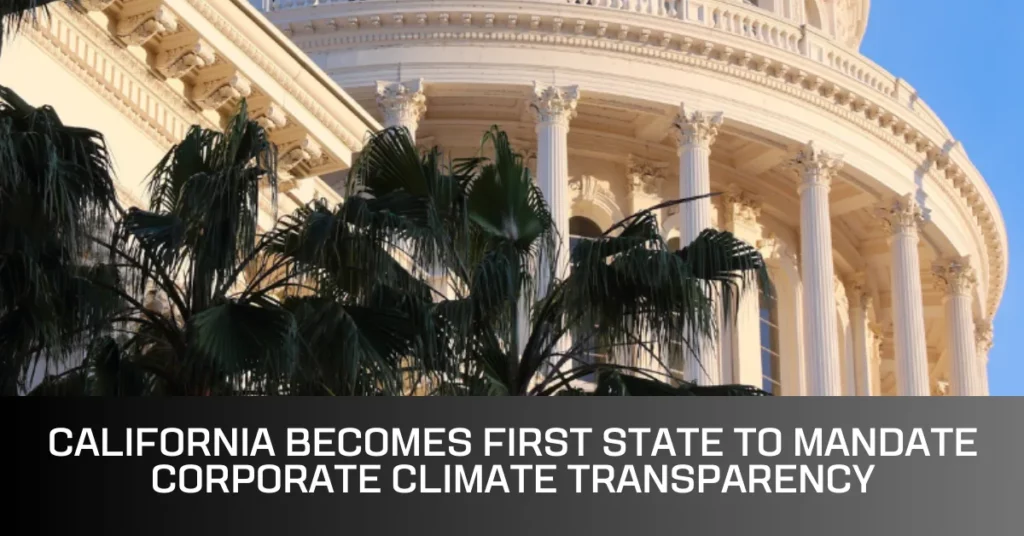California is set to become the first state in the nation to require major corporations to publicly report their greenhouse gas emissions, both from their own operations and from their supply chains and customers. The landmark legislation, SB 253, was passed by the state assembly on Monday night and awaits final approval by the state senate and Governor Gavin Newsom.
The bill aims to increase transparency and accountability for the companies that contribute the most to climate change and to encourage them to reduce their carbon footprint. According to the bill’s author, Senator Scott Wiener, the legislation will make California a global leader in corporate carbon transparency and help the state achieve its ambitious climate goals.
Our ground-breaking climate measure, SB 253, which mandates that major firms publish their carbon impact, has received a huge new endorsement from Apple:
Huge new endorsement — @Apple — of our groundbreaking climate bill to require large corporations to disclose their carbon footprint (SB 253).
Thank you, Apple, for making clear that this is doable & a critically important piece of climate action. pic.twitter.com/mntbWzXFDV
— Senator Scott Wiener (@Scott_Wiener) September 7, 2023
“Climate change is an existential threat to our planet and our way of life. We need bold action to reduce greenhouse gas emissions and hold polluters accountable,” Wiener said in a statement. “SB 253 will shine a light on the true impact of corporate activities on our climate and create incentives for companies to adopt more sustainable practices.”
The bill would apply to all U.S.-based companies that operate in California and have annual revenues of more than $1 billion. By 2026, these companies would have to disclose their direct emissions from their operations and electricity use, known as Scope 1 and Scope 2 emissions. By 2027, they would also have to disclose their indirect emissions from their supply chains and customers, known as Scope 3 emissions.
Scope 3 emissions typically make up the largest share of a company’s carbon footprint, but are often overlooked or ignored by voluntary reporting schemes. For example, a car manufacturer may report the emissions from its factories and offices, but not from the extraction of raw materials, the transportation of parts, or the use of its vehicles by consumers.
The bill would require the California Air Resources Board (CARB) to develop rules and standards for measuring and reporting emissions by 2025. The CARB would also publish the emissions data on a public website, allowing consumers, investors, regulators, and activists to access and compare the information.
The bill has received support from several major companies, such as Apple and Patagonia, as well as environmental groups and climate experts. Christiana Figueres, the former executive secretary of the United Nations convention behind the 2015 Paris climate agreement, endorsed the bill last week, calling it “a game-changer for global climate action.”
Check out some of the most recent trending articles:
- San Francisco Police Investigate Vandalism of Cruise Autonomous Vehicle
- 570 California Schools State Audit Targets for Low Vaccination Rates
However, the bill has also faced opposition from many other businesses and industry groups, who argue that it would impose an excessive burden on companies and create a competitive disadvantage for California-based firms. They also claim that the bill would duplicate existing federal regulations and voluntary initiatives.
The U.S. Securities and Exchange Commission (SEC) proposed federal rules in 2022 that would require publicly traded companies to disclose their climate-related risks and opportunities, including their greenhouse gas emissions. However, the SEC has not yet finalized the rules or specified whether they would include Scope 3 emissions.
Some companies have also voluntarily committed to disclosing their emissions and setting reduction targets through initiatives such as the Science Based Targets Initiative (SBTi) and the Task Force on Climate-related Financial Disclosures (TCFD). However, these initiatives are not mandatory or enforceable by law.
Supporters of SB 253 say that California’s bill would go beyond the federal rules and voluntary initiatives by covering all major companies operating in the state, not just publicly traded ones, and by requiring comprehensive disclosure of all scopes of emissions. They also say that the bill would create a level playing field for companies in California and spur innovation and efficiency in the market.
“California has always been a leader in climate action, and this bill is no exception,” said Assemblymember Chris Ward, who presented the bill on the assembly floor. “This bill will not only help us take a leap forward to address the climate crisis but also create economic opportunities for businesses that embrace sustainability.”
